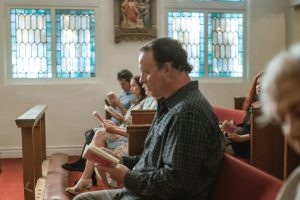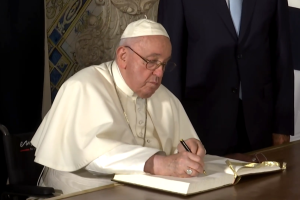"It's a zoo," sighs Father Donald B. Cozzens, who had been hoping for a quiet sabbatical to finish writing his next book. Instead, the bestselling author of The Changing Face of the Priesthood (Liturgical Press) has been patiently fielding an endless flood of calls from the national media. One day it's ABC News, the next day it's NPR, the Washington Post, or some pesky editor from U.S. Catholic!
In the current media frenzy around the scandals of priest sexual abuse and diocesan cover-ups, Cozzens stands out as a frank and insightful voice of reason and-being a former seminary rector and vicar of priests-as someone who knows what he's talking about. Cozzens doesn't mince words, but he is also confident that "the Spirit is with us in this crisis, and we will find a healthier church as we slowly grieve and heal and move through the present dark night."
In writing about priest sexual abuse, you once quoted the German philosopher Friedrich Nietzsche, who said, "Of necessity, the party man becomes a liar." Somehow, looking at the current crisis, this seems a particularly fitting quote. Many Catholics seem most shocked at what they perceive as an appalling lack of candor and honesty on the part of some of our leaders. Is that a fair perception?
For the most part, bishops and church officials do not see themselves as having been dishonest or as having done anything but trying to serve the best interests of the church. But many lay Catholics today, while they deeply regret the tragic harm done to apparently thousands of young people, are equally shocked and appalled at what they see as a cover-up and as dishonesty and lack of candor on the part of many of our church leaders.
I feel that the root of this problem may be a theologically naive understanding of loyalty and responsibility. These men are in leadership positions because they have indeed been responsible and loyal churchmen. And when the church's reputation and the sanctity of the priesthood are your top priorities, then you may end up framing scandals as mind-boggling as the abuse of minors by priests in ways that will make you speak and be heard as less than honest and candid.
What seems to have confounded many Catholics is an apparent lack of compassion, understanding, or maybe protective instinct on the part of church leaders in terms of the victims. What do you think the U.S. bishops can and should do to signal to the many victims as well as to all Catholics that they repent for their complicity in the evil actions and crimes that were committed by some of our priests?
I would like to see the bishops sincerely apologize to any victims who did not experience the church as compassionate, understanding, and ready to listen to allegations of misconduct with an open, nondefensive posture. I think a clear restatement that the healing and well-being of the victims remains the priority of the bishops is important. Many bishops are profoundly saddened by the abuse their parishioners have experienced at the hands of some of their priests. We as the whole church need to ritualize this profound concern for the victims, this profound sadness for the tragedy they have experienced.
What kind of ritual? Perhaps a penance service?
On Holy Thursday in my home diocese of Cleveland, at the washing of the feet, the bishop washed the feet of a woman who had been abused by a priest. She also spoke briefly at the Eucharist. Perhaps some other bishops did something similar in their dioceses.
In terms of the upcoming bishops' meeting, even though it will be June, maybe they could have a Lenten meal to demonstrate their sorrow for any role they may have played in adding to, rather than healing, the pain of the victims. They might also hold a prayer service.
I would love to see the bishops invite one or two victims of misconduct and one or two sets of parents to address their meeting. I think they should be victims and parents who have moved beyond anger and resentment, whose own healing has reached a point where they can speak to the bishops as witnesses to the harm that has gone on.
Another thing I'd love to see the bishops do is really listen to the experiences of their people and their priests.
You've talked before about this need for a more profound and frank dialogue, particularly about the state of the priesthood. Is this an opportunity now to have that kind of dialogue?
First of all, I think we priests and bishops tend to listen as hard as we can and therefore may be puzzled when people call us to listen. But, by our training and by our vocation, we tend to listen for questions so we can respond with an answer. Or we tend to listen for problems so we might respond with a solution.
I'm calling for a kind of listening that would be an honest dialogue, where the bishops themselves could be informed– and even on occasion transformed.
Do you see a greater openness to that now?
Well, being on a sabbatical, it's hard for me to say whether or not that is happening. It seems to me that the grace of the Spirit is working in the hearts of all of the church right now-victims, parents, laity, bishops. And I'm hoping we'll see sacred dialogue the likes of which we haven't seen.
I would love to see the bishops appreciate the need to have structures built into their conference that would allow laity and their priests to speak, when appropriate and, ofcourse, with the proper expertise, at their bishops' meetings. I believe it's rather unusual for nonbishops and nonpriests to speak at their conferences. I would also really like to see the bishops agree to full disclosure on how the laity's money is being spent, and, of course, full disclosure of credible reports of misconduct by priests that would put young people at risk.
I see what's happening today as a manifestation of an unraveling of the clerical culture. By clerical culture I refer to a system of privilege and deference, exemption, status, and especially secrecy that seems to be part and parcel of the celibate priesthood.
I would love to see other U.S. cardinals and bishops join Cardinal Roger Mahony in working to get all crucial issues on the table for honest reflection, study, and discussion-issues relating to married clergy and the roles of lay women and men in significant church leadership. I am convinced that if we had had parents involved in the crisis management that went on in chanceries on allegations of misconduct against teenagers by priests, significantly different and better decisions would have been reached.
But some continue to argue "The church is not a democracy." How do you reply to that?
Involving laywomen and men in higher leadership levels in the church does not mean the church is becoming a democracy. But when I hear that charge, I could counter that in some sense there has never been a more profound democracy in the history of Western civilization than the church. I'm not talking about a political democracy, I'm talking about communal discernment of the presence of the Holy Spirit.
In the early church, leaders listened differently than they do today. And I think the early church leaders included women as well as men, ordained as well as nonordained.
We're witnessing here the dawning of the age of the laity. The laity, I'm convinced, are going to call for greater accountability of church leaders. Bishops are as committed to the gospel as anyone, but I think it's the system in which we clerics live that has led to the spin that the official church has put on this scandal-the spin being that this is only a few bad apples who are besmirching the priesthood and the church; that we need only to find a way to identify them and get them out of the priesthood, and then all will be well.
The current crisis has renewed discussion of mandatory celibacy and the all-male priesthood. Is it fair to link those questions with the sexual abuse crisis?
I see a link between the abuse of minors and the present system of the church, which some have described as being a sick system. I'm not making a link between the all-male character of the priesthood and misconduct. I'm not making a link between sexual orientation and pedophilia, nor am I making a link between celibacy and misconduct in itself. I am suggesting that the present clerical system has allowed men, who see themselves as very faithful to the church, to make decisions that further harmed people who had already been harmed by priest abusers.
So our urgent mission this time is to free the Spirit to really work among God's people. And I think it's no longer acceptable to be told that you may not even discuss certain issues.
So you don't buy the argument that such talk is exploiting the current crisis for an agenda of church reform?
I think it's unfair to accuse people who would like to have the present system examined more honestly of having a "secret agenda." I hear this from conservatives regularly. That when people talk about systemic review and possible structural changes in the priesthood, they're simply out to foist upon the church their liberal agenda-married clergy, ordination of women, greater roles for the laity in church leadership. I think that charge is disingenuous.
Why?
Every thinking person should have a vision of where the church should be going. The only way not to have an agenda is to stop thinking and to stop imagining. It's like saying Galileo had an agenda and therefore he had to be squashed and threatened with not only excommunication but torture and death. Is it fair to say that the preeminent theologians of the Second Vatican Council-Marie-Dominique Chenu, Yves Congar, and John Courtney Murray-each had a secret agenda? I don't see that.
I find it interesting that conservative visions of the church are never called "agendas." Apparently only liberals have agendas. Conservatives may want to go back to a pre-conciliar church, but no one accuses them of having an agenda; we just see that as some strange notion of orthodoxy.
One of the issues currently under scrutiny is the formation of priests. What message do seminarians receive about sexuality?
The church's approach to human sexuality sends a very mixed message. On the one hand it raises human sexuality in marriage to the dignity of a sacrament, so it has a remarkable incarnational confidence in human sexuality. At the same time it also shows an almost convulsive suspicion about human sexuality. And it has overidentified holiness with sexual abstinence.
Seeing every deliberate sexual experience outside of marital intercourse open to procreation as not only sinful but seriously sinful creates an atmosphere that leads to a guardedness on the part of seminarians and novices. They don't feel they can speak openly and candidly about their experiences of their own sexuality, because to speak of their experiences might be to acknowledge their own sinfulness. And the church reserves such admission to the sacrament of Reconciliation, the only place where one should make a manifestation of conscience.
I would hope for a renewed theology of human sexuality. But many theologians and bishops are afraid to go there.
There are different claims about whether the incident rate of sexual abuse of minors is higher among priests than it is in the general population. What's your read?
I'm not aware of reliable studies about the incident rates of misconduct against minors by Catholic priests that compare them with clergy of other denominations or to other professionals that work with youth-teachers, coaches, scout leaders, social workers, or counselors. In the absence of those studies, I can only extrapolate from what I experience, what I read in the papers, and what is reported.
Authors such as Philip Jenkins feel that the incident rate is definitely not higher among priests than among clergy in other denominations. I respectfully disagree, especially when we consider that so many of the abuse allegations led to secret settlements. So it's hard for us to know how many credible allegations have been brought against priests, especially when the church until recently has been unwilling to make the numbers known.
If the bishops wanted to, they could easily find out if the incident rates are lower, the same, or higher compared with other clergy or helping professionals.
Could the priesthood appear inviting to abusers?
The priesthood appeals, I hope, to the best and brightest, the people who are really mature, committed, and want to further the gospel. It certainly does that. But the priesthood can also appeal to people who don't have a good sense of their own identity, who are conflicted about their sexuality, and who need the mantle of the priest persona to allow them to feel like they're somebody.
Recently I've heard bishops say, "What I'm looking for in a priest candidate is a man who would make a wonderful husband and father." And I'm arguing that the priests need to have the ability to connect well with other human beings.
You have written that, in contrast to the typical pedophile in the larger population, some 90 percent of priest abusers have been men who target teenage boys. In the wake of the current crisis, a Vatican official and some conservatives in the United States have picked up on that observation and are calling for a ban on all homosexually oriented priests. Is that part of the solution for the priest sexual abuse crisis?
In my judgment, absolutely not. It's unfair to the many, many committed, effective, talented, celibate, and chaste gay priests who serve the church today with distinction. To suggest that gay men should not be priests is mind-boggling to me. The church has been served well by gay and straight priests throughout its history. We've had gay individuals who are saints. We've had outstanding gay bishops.
For example?
I'll mention Gerard Manley Hopkins. There has been speculation about some highly revered saints and church leaders that I don't think I should name. But one current outstanding example is Franciscan Father Mychal Judge, the brave gay priest who gave his life ministering to firefighters on September 11.
Is the idea of a ban of gay priests even a realistic option?
It's not. If the church said, "We're not going to accept gay men into the seminary," in addition to it being biased, it can't be implemented. There is no perfect screening process, and if we tried, we'd be creating an atmosphere of subterfuge. If a candidate suspected that he was gay and felt a call from God to become a priest, he would be tempted to hide his orientation while going through the admissions procedure and psychological testing.
In addition, we would see our already critical seminary situation worsen. If the church tried to drive gay priests from the priesthood, it would significantly weaken our ranks. And if we wanted to be consistent, then we'd also have to ask the gay bishops to leave.
So if we shouldn't ban gay priests, should the church do anything about the gay subculture that apparently exists in some circles of the priesthood?
This is a very sensitive issue. just as there are straight priests who do not take celibacy and chastity seriously, so there are also some gay priests who do not take celibacy and chastity seriously. When we find examples of gay priests who seem to almost make a mockery of even an attempt to be celibate, we run the risk of coloring with the same brush gay priests in general.
So, are there straight priests who have used the priesthood as a shelter for their sexual activity? Yes. Are there gay priests who have used the priesthood as a shelter or screen for a life that is incompatible with chastity and celibacy? Yes. Do more gay priests seem to have a cavalier approach to celibacy than straight priests? I don't know. Some think that there is evidence to support that, but we just don't know.
People talk about this crisis as a historical moment, some even going so far as to compare it to the 16th-century Reformation. This may be overreaching, but can this become the beginning of a purification and renewal for the Catholic Church? And if so, what could you envision as the positive outcomes?
I will leave to historians whether this current crisis is comparable to the crisis we experienced in the 16th century. But it is profoundly significant by anyone's measure today. I believe the Spirit is with us in this crisis and we will find a healthier church as we slowly grieve and heal and move through the present dark night.
I think the priesthood will be purified. I hope the bishops will gain a new openness to the pastoral experience of their priests and the lived experience of their people. And I believe that the laity will speak more candidly to their pastors, the pastors will speak more candidly to their bishops, and the bishops will speak more candidly to the bishop of Rome and to the curia.
Where do you discern the Spirit being most at work right now in this terrible crisis?
I believe the Spirit is leading both laity and priests into a period of honest grieving and lamentation, and in the profound sadness that has gripped our hearts, we will hear the voice of the Spirit. My prayer is that the bishops will join their priests and laity in grieving and lamenting our institutional sins as well as our personal sins. The present situation is the responsibility of us all.
This article appeared in the June 2002 issue of U.S. Catholic (Vol. 67, No. 6, pages 18-22).














Add comment